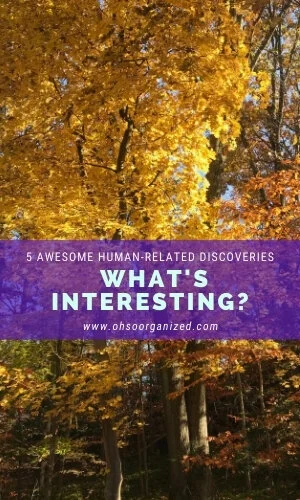The newest installment (v33) of the “What’s Interesting?” feature is here with my latest finds informing, educating, and relating to organizing and life balance. Included are unique, inspiring, wonderfully human-related discoveries, which reflect this month’s blog theme.
You are a generous, compassionate, and engaged group. I am deeply appreciative and grateful for your presence, positive energy, and contributions to this community. I look forward to your participation and additions to the collection I’ve sourced.
What do you find interesting?
What’s Interesting? – 5 Best Wonderfully Human-Related Discoveries
1. Interesting Read – Human Being
“Awareness is a capacity of the human mind…the state of being conscious of something.” This quote is from Diana Winston’s The Little Book of Being – Practices and Guidance for Uncovering Your Natural Awareness. Diana is an author, mindfulness teacher, and director of mindfulness education at UCLA’s Mindful Awareness Research Center.
Mindfulness practices have different areas of focus and awareness. In Diana’s book, she features natural awareness, which she says, “…is a way of knowing and a state of being wherein our focus is on the awareness itself rather than on the things we are aware of. It is generally relaxed, effortless, and spacious.” The book’s three sections help us understand what natural awareness is, share natural awareness meditation techniques, and give ways to informally practice natural awareness. What is the benefit of an awareness practice? Diana says, “…both natural awareness and classical mindfulness practices…give us a capacity to handle life.”
2. Interesting Product – Human Doing
This hot off the press game, Declutter Go!™, which officially goes on sale on November 15th, was invented by my amazing friend and colleague, Lynne Poulton, founder of Wholly Organized®. Declutter Go!™ is as fun and colorful as Lynne. The game entices you to get started, especially if you feel overwhelmed by clutter, with the roll of a dice or two or six.
This is a motivational tool that uses brain science and gamification to help you conquer clutter. The game will help prepare you to declutter, choose an action, set a time boundary for your decluttering session, select the room to work and enjoy a reward after completing three decluttering sprints. Designed by humans for humans, use this yourself, or play it with the whole family. Learn more at decluttergo.com.
3. Interesting Resource – Human Experiencing
With intolerance and hatred on the rise, we need more kindness and compassion in this world. One way to do this is to seek to understand rather than to “other.” The Human Library®, a non-profit developed in Denmark over 20 years ago, is a learning platform that hosts personal conversations that aim to “challenge stigmas and stereotypes” and talk with people you would not usually meet. They create a safe space to openly discuss topics between their “human books” and readers. The “human books” are volunteers who share their personal experiences. The Human Library® says, “difficult questions are expected, appreciated, and answered.” They host events virtually, in libraries, and other venues in over 80 countries.
“Awareness is a capacity of the human mind . . . a state of being conscious of something.”
4. Interesting Podcast – Human Listening
Last month I loved talking with Dr. Christine Li, Make Time for Success podcast host, psychologist, procrastination coach, and all-around extraordinary human being. Christine invited me to be a guest on her podcast for a two-part series. I shared ideas for managing clutter and discussed, at her request, the virtual organizing work we did together. If you missed our organizing conversations, listen here.
If you haven’t signed up for Christine’s podcast, add it to your listening cue now. She has a calm, warm way of normalizing the challenges we all face and sharing ways to overcome them. Christine is authentic, brave, and asks excellent, insightful questions. Her voice is so soothing. You come away feeling inspired along with learning simple, doable strategies for change.
5. Interesting Thought – Human Appreciating
The holidays can be full of stress, rushing, overdoing, and indulging. There are parties to host or attend, presents to purchase and wrap, and special meals to shop for and prepare. But here’s the thing. Many moments can be missed if we’re so focused on doing. We forget to stop, breathe, and notice the beauty and joy available to us. So while you are rushing and stressing, take a minute. Choose the lovely route to the store, take a forest walk in the rain, and slow down enough to be present. It will help you enjoy the holidays with more gratitude and less stress.
What are your interesting, wonderfully human discoveries? Which of these resonate with you? I’d love to hear your thoughts. I invite you to join the conversation.





















